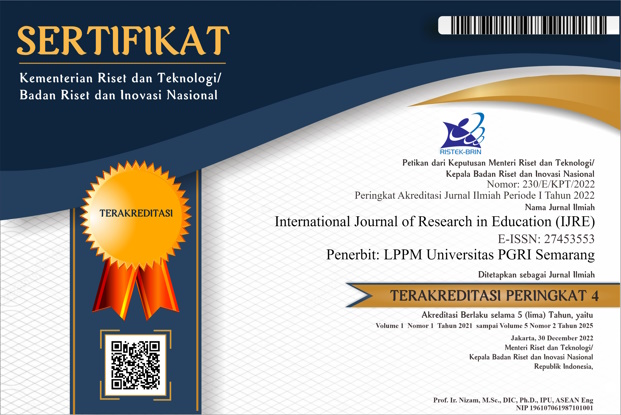Tourist Guide Writing Project: Assisting 4C Skills through Project-Based Learning in English for Tourism
DOI:
https://doi.org/10.26877/ijre.v4i2.460Keywords:
English for Tourism, PjBL, 4C Skills, Tour Guiding, WritingAbstract
One of the recommended teaching methods in the Indonesia’s Merdeka Belajar (Freedom to Learn) Curriculum is Project-based Learning (PjBL). This research aims to explore the implementation of PjBL in assisting the students’ 4C skills through a writing project in English for Tourism Class in Indonesia. This research employed a qualitative design to investigate the PjBL implementation by the teacher to the fifth semester students at a Tour Guiding Program. An open-ended questionnaire, interview, and teacher reflective notes were conducted to collect the data. The data analysis included data reading and categorization, data matching, data reduction, data display and interpretation, and drawing conclusions. The results showed that PjBL gave the opportunities to train the students’ 4C skills through group tasks, data collection, presentation, and the tourist spot visit. They also learned to develop an English writing text more meaningfully, and to construct knowledge about tourism from the real-world context. The challenges found were time limitation, student different characteristics, and teacher’s limited experiences. Teachers who are eager to apply PjBL may use this teaching procedure in this research with the considerations of these challenges and classroom needs. Besides, supplementing an observation method and expanding the research scope are recommended for future research
References
Bárcena, E. (2014). “Thinking about learning”: Exploring the use of metacognitive strategies in online collaborative projects for distance professional english learning. ES. Revista de Filología Inglesa, (35), 7-39.
Baroroh, K., Wahjoedi, Wahyono, H., Utomo, S. H., & Lestari, F. (2021). Incorporating village tourism into “community economy” course: A project-based learning method in university. International Journal of Instruction, 14(4), 567–584. https://doi.org/10.29333/iji.2021.14433a
Blumenfeld, Soloway, E., Marx, R. W., Krajcik, J. S., Guzdial, M., & Palincsar, A. (1991). Motivating Project Based Learning: Sustaining the Doing, Supporting thr Learning. In Educational Psychologist, 26(3), 369–398.
Condliffe, B., Quint, J., Visher, M. G., Bangser, M. R., Drohojowska, S., Saco, L., & Nelson, E. (2017). Project-based Learning: a Literature Review. Mdrc : Building Knowledge to Improve Social Policy, P-12 Education, 2.
Ennies, M. J., & Petrie, G. M. (2020). Teaching English for Tourism: Bridging research and praxis. Routledge.
Junaidi, D. (2020). Panduan Penyusunan Kurikulum Pendidikan Tinggi. Direktorat Jenderal Pendidikan Tinggi Kementerian Pendidikan dan Kebudayaan.
Kementerian Pariwisata Republik Indonesia (2015). Peraturan Menteri Pariwisata Nomor 13 Tahun 2015 tentang Standar Usaha Jasa Pramuwisata.
Kerdpol, S. (2015). An Application of Project-Based Learning on the Development of Young Local Tour Guides on Tai Phuan’s Culture and Tourist Attractions in Sisatchanalai District, Sukhothai Province. English Language Teaching, 9(1), 133. https://doi.org/10.5539/elt.v9n1p133
Kokotsaki, D., Menzies, V., & Wiggins, A. (2016). Project-based learning: A review of the literature.Project-based learning: A review of the literature. Improving Schools. SAGE Journals, 19(3), 267–277.
Krajcik, Joseph S. and Blumenfeld, P. C. (2005). PBL_Article, 317–334.
Larmer, J., & Mergendoller, J. H. (2010). Seven essentials for project-based learning. Educational Leadership, 68(1), 34–37.
Mathew, P., Mathew, P., & Peechattu, J. (2017). Reflective practices: A means to teacher tevelopment. Asia Pacific Journal of Contemporary Education and Communication Technology, 3(1), 126-131.
Musa, F., Mufti, N., Latiff, R. A., & Amin, M. M. (2012). Project-based learning (PjBL): Inculcating soft skills in 21st century workplace. Procedia - Social and Behavioral Sciences, 59(-), 565–573. https://doi.org/10.1016/j.sbspro.2012.09.315
Novita, M., Lestari, D., Sutrisna, P. E., Mpu, S., & Singaraja, K. (2022). Project-based learning dalam pembelajaran bahasa inggris pada program studi pariwisata. Coulture, 3(1), 40-49.
Nutalak, P. (2020). Enhancing business English major students’ vocabulary knowledge through project-based learning: A case study of the 4th year students studying English for Tourism. Southeast Bangkok Journal. 6(2), 56–69.
Olivia, R., & Pakpahan, A. (2018). Improving speaking skill of tourism vocational high school students through project-based learning. Retain, 6, 44–51.
Ozturk, M. (2022). Project-based learning as the form of extracurricular work in teaching english aimed at formation of social competence of tourism students. Journal of Education and Human Development, 11(2), 4–10. https://doi.org/10.15640/jehd.v11n2a2
Pinelopi, P. (2015). English for specific purposes: How to teach english for tourism. International Journals of English Literature and Culture, 3, 235–238. https://doi.org/10.14662/IJELC2015.069
Phung, B, T. (2018). Project-based learning activities in english for tourism class. 7th International Research Symposium on PBL: Innovation, PBL and Competences in Engineering Education, 331-340.
Puslapdik Kemendikbudristek. (2021, December 29). Project-based learning, profil pelajar Pancasila, dan gen z. https://puslapdik.kemdikbud.go.id/project-based-learning-profil-pelajar-pancasila-dan-gen-z/
Puspitasari, I., & Setiawan, K. (2020). Menyongsong revolusi industri 4.0 melalui penerapan project-based learning pada kelas bahasa inggris peminatan pariwisata. Prosiding Seminar Nasional, 186–195.
Simarmata, H. A., & Mayuni, I. (2023). Curriculum reform in Indonesia: From competency-based to freedom of learning. International Journal of Pedagogical Novelty, 2(2), 1-13. https://jurnal.pustakagalerimandiri.co.id/index.php/IJOPNOV
Sugie, S., & Mitsugi, M. (2008). Design and evaluation of intercultural cooperative project-based learning in the field of inbound tourism in Japan: A tour guide training course with Chinese and Japanese learners. Intercultural Communication Education, 4(3), 234–251. https://doi.org/10.29140/ice.v4n3.560
Suherman, Prananda, M. R., Proboningrum, D. I., Pratama, E. R., Laksono, P., & Amiruddin. (2020). Improving higher order thinking skills (HOTS) with project-based learning (PjBL) Model assisted by Geogebra. Journal of Physics: Conference Series, 1-13. https://doi.org/10.1088/1742-6596/1467/1/012027
Ulfa, S. M. (2017). English for Tourism: Bridging students to have better communicative and life skills through doing project based learning. The 3rd English Teaching Conference 2017, 1–23.
Sulistyorini, H. (2018). Literary tourism on teaching english drama appreciation with a model project-based learning: A play performance of ‘Sangkuriang, the Legend of Tangkuban Perahu’. 2nd ELLiC, 403-410.
Syahril, Purwantono, Wulansari, R. E., Nabawi, R. A., Safitri, D., & Kiong, T. T. (2022). The effectiveness of project-based learning on 4Cs skills of vocational students in higher education. Journal of Technical Education and Training, 14(3), 29–37. https://doi.org/10.30880/jtet.2022.14.03.003



